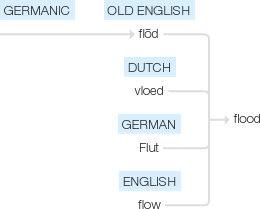Flood
Old English flōd, of Germanic origin; related to Dutch vloed and German Flut, also to flow.
wiktionary
From Middle English flod, from Old English flōd, from Proto-West Germanic *flōdu, from Proto-Germanic *flōduz, from *plew-(“to flow”). Cognate with Scots flude, fluid, Saterland Frisian Floud, Dutch vloed, German Flut, Danish flod, Icelandic flóð, and Gothic 𐍆𐌻𐍉𐌳𐌿𐍃( flōdus).
etymonline
flood (n.)
Old English flōd "a flowing of water, tide, an overflowing of land by water, a deluge, Noah's Flood; mass of water, river, sea, wave," from Proto-Germanic *floduz "flowing water, deluge" (source also of Old Frisian flod, Old Norse floð, Middle Dutch vloet, Dutch vloed, German Flut, Gothic flodus), from suffixed form of PIE verbal root *pleu- "to flow" (also the source of flow). In early modern English often floud. Figurative use, "a great quantity, a sudden abundance," by mid-14c.
flood (v.)
1660s, "to overflow" (transitive), from flood (n.). Intransitive sense "to rise in a flood" is from 1755. Related: Flooded; flooding.
